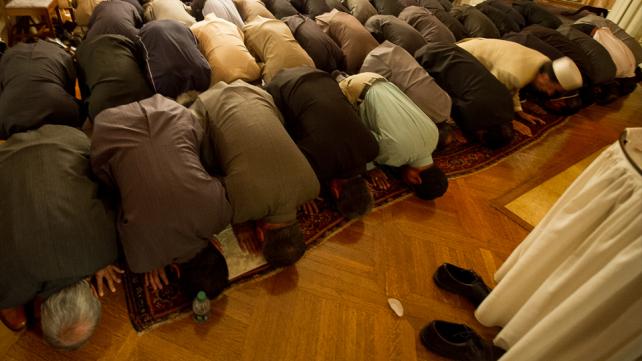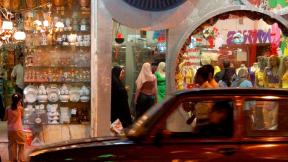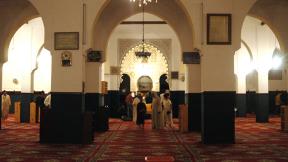
It is that time of the year once again. It is the advent of a month that is filled with innumerable Ramdan blessings, the thirty days which require a Muslim to observe one of the five pillars of Islam, fasting.
Blessings of Ramadan is characterized not just by its obligation on every Muslim to keep away from certain things which are allowed in other months, but also by the weight of blessings attached to every good deed performed in this month.
So what are these unique features which make Ramadan such a special and sanctified month for Muslims the world over?
Ramdan Blessing is robably the most significant is the fact that in this month, as we are told by Allah, the gates of Heaven are thrown open, the gates of Hell are closed and the devils are chained. This essentially signifies that, in Ramadan, the devils and their advocates have a much more difficult job diverting true Muslims from fully reaping the bounties of Allah by performing every religious duty with a pure intention.
Allah's Messenger (peace be upon him) said, "When the first night of Ramadan comes, the devils and the rebellious jinn are chained, the gates of Hell are locked and not one of them is opened; the gates of Paradise are opened and not one of them is locked; and a crier calls, 'You who desire what is good, come forward, and you who desire evil, refrain.' Some are freed from Hell by Allah, and that happens every night." (Tirmidhi).
Another significance of this month is the act of fasting itself. Fasting inculcates self-restraint and self-control as the person fasting does not only have to abstain from food and drink, but s/he must also refrain from many other things: backbiting, gossiping, fighting, using foul language etc. Very strict words have been used in this regard:
The Prophet said, "Whoever does not give up false statements (i.e. telling lies), and evil deeds, and speaking bad words to others, Allah is not in need of his (fasting) leaving his food and drink" (Bukhari).
He also said, "If one of you is fasting, he should avoid sexual relation with his wife and quarreling, and if somebody should fight or quarrel with him, he should say, 'I am fasting'" (Bukhari).
It is logical that if the aim of fasting was only to stop eating and drinking for a specific period of time, then the spiritual objectives of fasting, which have been specified in the Quran, would not have been met. In the Quran, Allah specifically says:
O ye who believe! Fasting is prescribed for you, even as it was prescribed for those before you, that ye may ward off (evil) (2:183).
As one can see from the above verse, Muslims have been commanded to fast, so that they attain righteousness. And what is meant by righteousness? The Arabic word in this verse is "Muta'qeen" taken from the word "Taqwa." To attain Taqwa or righteousness means to fear Allah and to obey His every Command. And by fasting for thirty days, we are doing just that. Fasting is never done for any material or worldly gain. Fasting is done mainly because it is the command of Allah for Muslims to follow. And it is this spirit which is the cause of instilling "Taqwa" in Muslims. Part of a saying of the Prophet reported in Bukhari is the following:
"Allah said, ‘All the deeds of Adam's sons (people) are for them, except fasting which is for Me, and I will give the reward for it.'"
Also, fasting is an action which, we are told, will act as a shield for us when we most need it, i.e. on the Day of Judgement. On that day, when we will be called to give an account of every good and bad deed done in this world, fasting will intercede for us, provided of course, that every condition about the purity of intention and refraining from forbidden activities was done. This is supported by the following Hadiths:
Allah's Apostle said, "Fasting is a shield or protection from the fire and from committing sins" (Bukhari).
Allah's Messenger, peace and blessings be upon him, said, "Fasting and the Quran intercede for a man. Fasting says, 'O my Lord, I have kept him away from his food and his passions by day, so accept my intercession for him.' The Quran says, 'I have kept him away from sleep by night, so accept my intercession for him.' Then their intercession is accepted" (Tirmidhi).
Such importance is attached to fasting, that numerous glad tidings are given in the Hadiths to those who fast truly for Allah’s sake and for the sake of obeying His Command solely to earn His Pleasure in the life Hereafter. Some of the Hadiths are:
Allah’s Apostle said, "By Him in Whose Hands my soul is, the unpleasant smell coming out from the mouth of a fasting person is better in the sight of Allah than the smell of musk. There are two pleasures for the fasting person, one at the time of breaking his fast, and the other at the time when he will meet his Lord; then he will be pleased because of his fasting." (Bukhari).
The Prophet said, "Paradise has eight gates, and one of them is called Ar-Raiyan through which none will enter but those who observe fasting." The Prophet also said, "If a person spends two different kinds of something (for Allah's cause), he will be called from the gates of Paradise" (Bukhari).
Allah's Messenger, peace and blessings be upon him, said, "There is Zakat applicable to everything, and the Zakat of the body is fasting" (Tirmidhi).
I heard Allah's Messenger, peace and blessings be upon him, saying: "He who would meet Allah (in the state) that he has not associated anything with Him, he has offered five (daily prayers), and observed the fast of Ramadan he will be pardoned."
I said: Allah's Messenger, should I not convey this happy news to them (to the Muslims)? He said: "Let them go on doing good deeds" (Tirmidhi).
Fasting also imbues in Muslims, the spirit of charity. Abstaining from food and drink gives a firsthand experience to the more privileged as to what the less fortunate may have to endure the year around. Hence, it acts as a spur for them to donate more to charity and to give out of their wealth to those who cannot afford the same luxuries that they do. The following Hadiths add to this spur:
Allah's Messenger, peace and blessings be upon him, said, "He who gives one who has been fasting something with which to break his fast, or who equips a fighter, will have a reward equivalent to his" (Tirmidhi).
Yet another blessing of this month is that every good deed done in it, whether it be giving charity or reciting the Quran, carries an extra weight of blessings. This good news is given to the people in the following Hadith:
The Prophet said, "(Allah says about the fasting person), 'He has left his food, drink and desires for My sake. The fast is for Me. So I will reward (the fasting person) for it and the reward of good deeds is multiplied ten times'" (Bukhari).
In another place it is even promised that a Nafil act will get the reward which a Sunnah act gets in other months; a Sunnah act will get the reward of a Fard (obligatory) act. And the Fard act will get the reward ten times more than that in the other days. Hence, this lure of rewards acts as a spur for us to perform more and more good deeds and refrain from more and more bad ones. Since the devil is chained, the latter becomes easier.
We have in our Prophet Muhammad, peace and blessings be upon him, a role model and
Ibn Abbas said that Allah's Apostle was the most generous of all the people, and he used to reach the peak in generosity in the month of Ramadan when Gabriel met him. Gabriel used to meet him every night of Ramadan to teach him the Quran. Allah's Apostle was the most generous person, even more generous than the strong uncontrollable wind (in readiness and haste to do charitable deeds).
Another factor, which distinguishes Ramadan from other months, is the advent of the Night of Power or Lailat-ul-Qadr. The Night of Power is said to be the one in which Allah writes the decree of His creation. In verses three to five 5 of Surah Al-Qadr, God says:
"The Night of Power is better than a thousand months. The angels and the Spirit descend therein, by the permission of their Lord, with all decrees. (That night is) Peace until the rising of the dawn."
Allah's Messenger said, "Ramadan, a blessed month, has come to you during which Allah has made it obligatory for you to fast. In it the gates of Heaven are opened, the gates of al-Jahim are locked, and the rebellious devils are chained. In it Allah has a night which is better than a thousand months. He who is deprived of its good has indeed suffered deprivation" (Tirmidhi).
Numerous blessings are promised to those who perform prayers through this night. This is the Night when sins are forgiven, Heaven is opened for certain people and the doors of Hell are closed for others. The Prophet said: "Whoever established prayers on the night of Qadr out of sincere faith and hoping for a reward from Allah, then all his previous sins will be forgiven; and whoever fasts in the month of Ramadan out of sincere faith, and hoping for a reward from Allah, then all his previous sins will be forgiven" (Bukhari).
But we have not been told exactly which night of Ramadan Lailat-ul-Qadr falls on. All we have been told is that we must search for it in the odd numbered nights, in the last ten days of Ramadan. This in itself is another of Ramadan’s unique characteristics.
Ubada bin As Samit related that Allah's Apostle went out to inform the people about the (date of the Night of decree (Al-Qadr). There happened a quarrel between two Muslim men. The Prophet said, "I came out to inform you about the Night of Al-Qadr, but as so-and-so and so-and-so quarreled, so the news about it had been taken away; and may be it was better for you. So look for it in the ninth, the seventh, or the fifth (of the last ten days of Ramadan)" (Bukhari).
Aisha said that Allah's Apostle said, "Search for the Night of Qadr in the odd nights of the last ten days of Ramadan" (Bukhari).
However, the purity of intention is stressed here as well. Only those prayers will be heard which are performed with sincerity and to get sins forgiven. If the intention is to look righteous to other people, it goes without saying that the person might as well go to sleep.
Allah's Messenger said, "Many a one who fasts obtains nothing from his fasting but thirst, and many a one who prays during the night obtains nothing from his night prayers but wakefulness" (Tirmidhi).
Ramadan is an amazing month. There is a flow of blessings and rewards from Allah to those who truly want to reap the full benefits from these thirty days. Probably the best thing about Ramadan is the fact that each and every action is done truly for Allah and each serves to strengthen our faith in Him. There are no strings attached to any action, as they normally are with most of our routine work. Ramadan is not just a month in which we refrain from food and drink for a few hours. It is a chance to make up for the time lost around the year in other work and revert to Allah, beg forgiveness for the sins done around the year, and finally, a chance to better the life awaiting in the Hereafter.
May Allah help us all to make every fast this Ramadan a shield in the Hereafter and an intercessor in the grave. May Allah not make us one of those who do not get anything from their fasts except for hunger and thirst. And May Allah guide us towards making this Ramadan a source for gathering numerous blessings and getting our major and minor sins forgiven. Ameen.








Comments
Add new comment